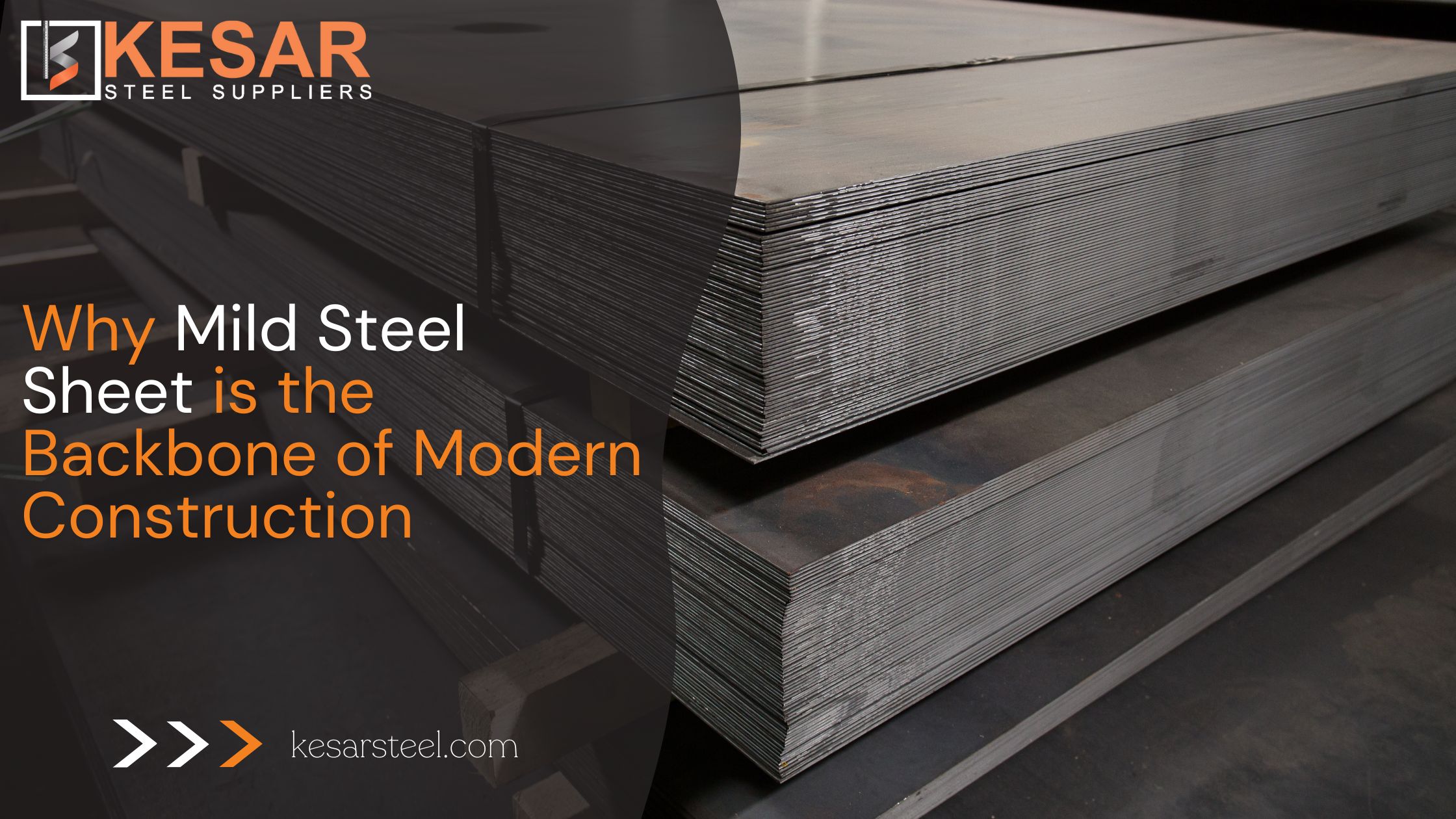Why Mild Steel Sheet is the Backbone of Modern Construction

18th Aug 2025
Every strong building, bridge, or industrial structure starts with the right material. In construction, the materials you choose affect not just the strength and safety of a structure, but also your budget and timelines. Among the many options out there, mild steel (MS) sheets have proven time and again to be reliable, versatile, and cost-effective.
From soaring skyscrapers to residential towers, from bridges to factories, MS sheets are everywhere. Their combination of strength, flexibility, and affordability makes them a favorite among engineers, architects, and fabricators alike.
In this article, we’ll explore why mild steel sheets are considered the backbone of modern construction, including their properties, advantages, applications, and tips for choosing the right sheet for your project.
What is a Mild Steel Sheet?
A mild steel sheet is a flat, thin plate made from low-carbon steel, usually containing between 0.05% and 0.25% carbon. This low carbon content gives it a perfect balance of strength and flexibility—strong enough for heavy-duty applications, yet easy to cut, bend, or weld for complex designs.
MS sheets come in different thicknesses, sizes, and grades. They are usually sold by weight or per kilogram, and builders often check the thickness and weight to plan materials efficiently.
These sheets quietly form the backbone of countless structures, providing the support that modern construction relies on.
Key Properties of Mild Steel Sheets
Mild steel sheets offer several key benefits that make them a go-to choice in construction:
- Strength and Durability: They can handle heavy loads and structural stress without failing, ensuring your project lasts for decades.
- Ductility: Their flexibility allows them to be bent, rolled, or shaped without cracking—perfect for intricate designs.
- Weldability: Mild steel is easy to join with other steel components, ideal for large-scale construction.
- Cost-Effective: Compared to stainless steel or alloy options, MS sheets are budget-friendly without compromising quality.
- Eco-Friendly: Being fully recyclable, mild steel supports sustainable construction practices.
These features make MS sheets versatile, reliable, and indispensable across industries.
Advantages of Mild Steel Sheets in Construction
Builders, engineers, and fabricators often choose MS sheets for several reasons:
- Strength with Flexibility: MS sheets provide structural stability while adapting to environmental stress and vibrations.
- Affordable Solution: The rate per kg of MS sheets is lower than materials like aluminum or stainless steel, making it easier to manage budgets.
- Corrosion Resistance (with Treatment): Galvanized or coated sheets can withstand humidity and coastal environments.
- Easy to Work With: Cutting, drilling, bending, or welding is simple, which saves both time and labor costs.
- Wide Availability: Trusted suppliers like Kesar Steel offer a range of sizes, thicknesses, and IS-certified grades to meet project requirements.
Common Applications of Mild Steel Sheets
The versatility of MS sheets allows them to be used across a wide range of industries:
- Construction: Roofing, flooring, beams, and reinforcements.
- Infrastructure: Bridges, highways, flyovers, and railway components.
- Industrial Use: Manufacturing plants, storage tanks, and pipelines.
- Automotive Industry: Body panels, chassis, and vehicle frames.
- General Fabrication: Doors, windows, furniture, and custom steel parts.
Take a look around any modern city, and you’ll notice MS sheets playing a silent but crucial role in supporting everything from buildings to industrial equipment.
MS Sheet Thickness and Weight
Choosing the right thickness of an MS sheet is essential—it directly affects the sheet’s strength, weight, and cost. Standard thicknesses usually range from 2 mm to 10 mm or more, depending on the application:
- Thinner Sheets (2–3 mm): Ideal for roofing, light fabrication, and sheet metal work.
- Medium Sheets (4–6 mm): Suitable for structural reinforcements, industrial equipment, and vehicle parts.
- Thicker Sheets (8–10 mm+): Best for heavy-duty applications like bridges, flyovers, and large industrial frameworks.
The weight of a sheet increases proportionally with thickness, making it important to calculate the exact requirements for budgeting and transportation. For standard 8 × 4 ft sheets, approximate weights can guide contractors in planning their purchases efficiently.
For complete weight details, IS-certified sizes, and specifications, you can refer to the MS Sheet Weight Chart.
How to Choose the Right MS Sheet for Your Project
With so many options available, selecting the right MS sheet might seem tricky. Here are some tips to make it easier:
- Check Thickness Requirements: Heavier projects require thicker sheets.
- Consider Weight and Density: Knowing the approximate weight helps with cost estimation and transportation.
- Compare Pricing: Review the rate per kg from multiple suppliers before ordering.
- Ensure Certification: Always choose IS-grade certified sheets for guaranteed quality.
- Pick a Trusted Supplier: Working with a reliable supplier like Kesar Steel ensures authenticity, timely delivery, and expert guidance.
Why Choose Kesar Steel for Your MS Sheet Needs?
In construction, quality and trust matter. At Kesar Steel, we don’t just supply steel—we partner with you to support your project’s success.
- IS-certified MS sheets for assured quality.
- Wide range of thicknesses and sizes for every type of project.
- Competitive rates per kg for bulk buyers.
- Fast and reliable delivery across India.
- Customized solutions for industrial, commercial, and construction projects.
With Kesar Steel, you’re investing in reliability, quality, and peace of mind—ensuring your structures stand the test of time.
Conclusion
Mild steel sheets are essential in modern construction—from skyscrapers and industrial plants to bridges and infrastructure. Their strength, flexibility, and affordability make them a trusted choice for builders, engineers, and fabricators.
Choosing the right thickness, grade, and supplier ensures your project is safe, durable, and cost-effective.
Contact us today at Kesar Steel to get high-quality IS-grade MS sheets and build with confidence.






